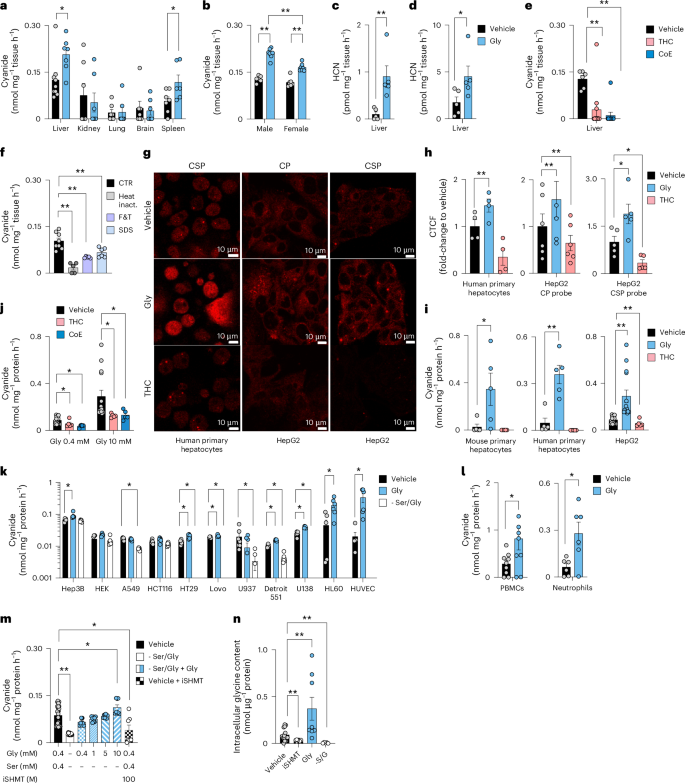Regulation of mammalian cellular metabolism by endogenous cyanide production
IF 18.9
1区 医学
Q1 ENDOCRINOLOGY & METABOLISM
引用次数: 0
Abstract
Small, gaseous molecules such as nitric oxide, carbon monoxide and hydrogen sulfide are produced as signalling molecules in mammalian cells. Here, we show that low concentrations of cyanide are generated endogenously in various mammalian tissues and cells. We detect cyanide in several cellular compartments of human cells and in various tissues and the blood of mice. Cyanide production is stimulated by glycine, occurs at the low pH of lysosomes and requires peroxidase activity. When generated at a specific rate, cyanide exerts stimulatory effects on mitochondrial bioenergetics, cell metabolism and cell proliferation, but impairs cellular bioenergetics at high concentrations. Cyanide can modify cysteine residues via protein S-cyanylation, which is detectable basally in cells and mice, and increases in response to glycine. Low-dose cyanide supplementation exhibits cytoprotective effects in hypoxia and reoxygenation models in vitro and in vivo. Conversely, pathologically elevated cyanide production in nonketotic hyperglycinaemia is detrimental to cells. Our findings indicate that cyanide should be considered part of the same group of endogenous mammalian regulatory gasotransmitters as nitric oxide, carbon monoxide and hydrogen sulfide. Zuhra and Petrosino et al. report evidence that cyanide acts as a regulatory gasotransmitter in mammalian cells, where it is shown to affect cellular bioenergetics, most likely via protein S-cyanylation.


内源性氰化物产生对哺乳动物细胞代谢的调节
小的气体分子,如一氧化氮、一氧化碳和硫化氢,在哺乳动物细胞中作为信号分子产生。在这里,我们表明,低浓度的氰化物产生内源性在各种哺乳动物的组织和细胞。我们在人体细胞的几个细胞区室、各种组织和老鼠的血液中检测到氰化物。甘氨酸刺激氰化物的产生,在溶酶体的低pH下发生,并且需要过氧化物酶的活性。当氰化物以特定的速率产生时,对线粒体生物能量、细胞代谢和细胞增殖有刺激作用,但在高浓度时损害细胞生物能量。氰化物可以通过蛋白质s -氰化修饰半胱氨酸残基,这在细胞和小鼠中基本可以检测到,并且对甘氨酸的反应会增加。体外和体内低剂量氰化物补充在缺氧和再氧化模型中显示出细胞保护作用。相反,在非酮症高血糖症中,病理性升高的氰化物产生对细胞是有害的。我们的研究结果表明,氰化物应该被认为是与一氧化氮、一氧化碳和硫化氢一样的内源性哺乳动物调节气体递质的一部分。
本文章由计算机程序翻译,如有差异,请以英文原文为准。
求助全文
约1分钟内获得全文
求助全文
来源期刊

Nature metabolism
ENDOCRINOLOGY & METABOLISM-
CiteScore
27.50
自引率
2.40%
发文量
170
期刊介绍:
Nature Metabolism is a peer-reviewed scientific journal that covers a broad range of topics in metabolism research. It aims to advance the understanding of metabolic and homeostatic processes at a cellular and physiological level. The journal publishes research from various fields, including fundamental cell biology, basic biomedical and translational research, and integrative physiology. It focuses on how cellular metabolism affects cellular function, the physiology and homeostasis of organs and tissues, and the regulation of organismal energy homeostasis. It also investigates the molecular pathophysiology of metabolic diseases such as diabetes and obesity, as well as their treatment. Nature Metabolism follows the standards of other Nature-branded journals, with a dedicated team of professional editors, rigorous peer-review process, high standards of copy-editing and production, swift publication, and editorial independence. The journal has a high impact factor, has a certain influence in the international area, and is deeply concerned and cited by the majority of scholars.
 求助内容:
求助内容: 应助结果提醒方式:
应助结果提醒方式:


